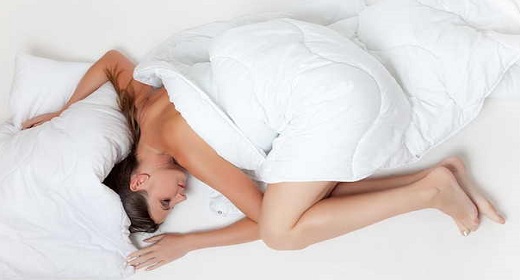Just like your body changes as you grow older, the way you sleep is also affects…
In this article, we take an in depth look at sleep and aging. That is, how does sleep change as you age. And, does sleep affect aging.
These are two of the most common questions we get from people who are concerned with sleep and growing old.
As such, our goal is to help you understand the relationship between these two inevitable things in life.
How Does Sleep Change As We Age?
During your life, you’ll notice that the number of hours you need to sleep changes. In general, the younger you are the more hours of sleep is needed. But, as you get older, the amount of nightly rest slowly decreases all the way until your senior years.
| Age | Number of Hours of Sleep Need |
| Newborns | 14 to 17 hours |
| 1 to 4 years old | 10 to 14 hours |
| 6 to 13 years old | 9 to 11 hours |
| 14 to 17 years old | 8 to 10 hours |
| 18 to 64 years old | 7 to 9 hours |
| 65 years and older | 7 to 8 hours |
- Newborns need the most amount of sleep, typically anywhere over 14 hours a day
- Between the ages of 1 to 4 years old, the hours slightly decrease to about 12 or so hours.
- During your childhood, the goes down further to 9 to 11 hours.
- But your teens, you’re down to 8 to 10 hours.
- Bulk of your life between the ages of 18 to 64 years old, you’ll need 7 to 9 hours of sleep nightly.
- As you get older, the amount of sleep decreases to between 7 and 8 hours per night.
Do People Sleep More as They Get Older?
Older people need less sleep than younger individuals because as we age our body lowers its requirement for sleep to minimize the effects of daytime sleepiness and lethargy (1).
Older people sleep less than younger people due to a decrease in melatonin production throughout the night. They also tend to wake up sooner due to this biochemical change in the brain.
This decrease in melatonin also allows an individual to spend less time in slow wave sleep which is deep restorative sleep. While the sleep is essential for memory and recall, it’s worth noting that too much slow wave sleep will leave you exhausted when you wake up (1).
Do Circadian Rhythms Change with Age?
As we age our circadian rhythm shifts quite a bit. And while this isn’t the only reason older individuals sleep less, it is a contributing factor (2).
Older individuals experience twice the amount of time spent awake during the night compared to younger people. But, they also report less daytime lethargy.
This is partially because the subcortical structures in the brain that help produce the circadian rhythm are slowly degraded as part of the natural aging process. This degradation also results in younger people sleeping sooner at night and waking earlier in the day.
How Do Our Sleep Patterns Change as We Get Older?
As we mentioned above sleep patterns change with age. These changes stem mostly from biochemical shifts within the brain and natural degradation of the circadian rhythm as part of healthy aging (1, 2).
Older individuals are more likely to fall asleep earlier in the evening and wake up earlier in the morning. This is thought to be because the circadian rhythm relies more on natural light cycles as we age. But, more investigation is needed to prove this (2).
One of the things you’ll also notice as you age is that naps also become harder to take as we get older. This is because we require less sleep. People beyond middle-age also take twice as much time to fall asleep during the day compared to their twenty to thirty-year-old counterparts, even under sleep deprived conditions (1).
Changes in Sleep Stages as You Age
As we age, we require less sleep at night. But, we also spend less time in certain sleep stages throughout the night. And, this can have a variety of effects on our mental state (3).
One example is that we spend less time in REM sleep as we age, especially after we turn sixty (3). We also have more frequent interruptions during non-REM stage three sleep as we get older. This results in us feeling less rested the next morning, despite sleeping fewer hours per night.
Since we experience less deep sleep as we get older, we don’t see the same rejuvenating effects to our memory and cognition as much as we did when we were younger (2).
Also, as we get older, less growth hormone and decreased levels of melatonin will be produced. This results in more sleep disruptions and difficulty falling asleep at night (1, 2).
Similarly, the shifts in sleep stages as we age aren’t entirely predetermined. Some of the effects can be attributed to the medications that older populations take which commonly enhance sleeping issues (3).
How Does Lack of Sleep Cause Premature Aging?
While you do sleep less as you get older, it’s also worth noting that not getting enough sleep can accelerate aging. Sleep deprivation affects both your physical looks as well as your mental and physiological well-being.
As a result, it’s not only your skin that prematurely ages, but lack of sleep also causes unnecessary cell aging. This causes you to “get older” inside and out.
1. It Affects Your Skin
Sleep deprivation, whether it is acute or chronic, will cause your body to age prematurely. And, it will be most noticeable in your skin (4).
When you are sleep deprived, your skin experiences higher levels of transepidermal water loss compared to someone who is well-rested. This increase in transepidermal water loss causes more fine lines and wrinkles. And, over time it will age your face greatly.
Water loss from your face isn’t the only thing that ages you when you miss sleep. Because your skin won’t recover as fast from UV exposure, your skin experiences premature folding.
DNA degradation and hampered collagen production also contribute to premature aging. But, we will discuss that in more detail below.
While you can try to use moisturizers and sunscreen to offset premature aging, you need to get the required amount of sleep every night to try and negate or offset some of the effects of sleep deprivation.
2. It Accelerates Cell, Tissue, Gene and DNA Aging
Your DNA is responsible for all genetic programming that goes on in your body. This includes the aging process and phenotypic traits you have. Unfortunately, sleep deprivation damages your cells, tissues, and DNA (5).
DNA damage typically occurs from UV exposure you receive from the sun. And, your body counters these aging effects by repairing itself during stage three sleep at night.
But, when you’re sleep deprived or experience sleep loss, it results in the thinning of your skin barrier because of this damage.
Thinning of your skin barrier enhances the look of wrinkles. This is especially true when it comes to chronic sleep loss.
Similarly, your cells and tissues are also restored during non-REM sleep. And, when you miss out on a few hours rest per night, your cells and tissues lose water, thin out, and can lead to saggy lackluster skin.
3. Your Brain Ages Faster as Well
Lack of sleep can cause disruptive cognitive effects and results in premature aging of your brain (6).
Sleep deprivation will increase the number of mistakes you make in your daily life because you miss out on the restorative effects nighttime sleep has on the brain.
As you age, you also experience some decrease in cognitive abilities. But, if you’re missing out on sleep regularly, you’ll become more forgetful. And, you’ll unknowingly speed up memory degeneration along and overall awareness.
Lack of sleep is especially detrimental to learning and recall because it makes your neurons less able to coordinate information through multiple pathways. Similarly, when you miss out on slow wave sleep, you experience more cognitive dysfunction and this trend worsens with age.
4. You’re More Prone to Chronic Diseases
When sleep deprivation becomes chronic, you can experience premature aging to your skin and DNA. But, it doesn’t end there. You will also experience increased incidence of chronic diseases that are often associated with age (7).
For example, lack of sleep will cause you to put on weight faster. And, this contributes to the development of heart disease, diabetes, and chronic pain associated with weight gain.
You are also up your risk for high blood pressure because sleep deprived people have an increase to their resting blood pressure.
Similarly, lack of sleep can likewise cause you to develop insulin resistance, which often leads to diabetes. This is because exhaustion often leads to faster depletion of insulin stores which contributes to the premature of diabetes and other chronic disorders (7, 8).
5. Increased Risk of Dementia
Extended amounts of sleepless nights may expedite the development of dementia (9).
When you repeatedly miss out on non-REM sleep including stage one, stage two, and stage three sleep your brain is more vulnerable to memory loss and the development or progression of Alzheimer’s Disease.
Scientists found that beta-amyloid proteins suspected to catalyze memory loss disorders like Alzheimer’s accrue in individuals who suffer from excessive sleep loss. This may make at risk individuals progress into dementia faster.
These proteins also increase sleep disturbances and the progression of sleep disorders, which makes the relationship between sleep loss and dementia even worse.
6. Higher Risk of death
Sleep deprivation alone does not cause death or near-death incidences. However, some of the conditions and occurrences that we discussed previously can increase the likelihood of death (10).
With extended sleep loss premature aging occurs, the most likely cause of mortality from premature aging would be the chronic health conditions that often come along with insomnia (7).
Another reason sleep deprivation increases mortality rate is because of the cognitive disturbances it can cause. For example accidents in motorized vehicles are more common in individuals who have not had quality sleep (1).
Similarly, the expedited development of dementia due to the increase in proteins we mentioned earlier, can also increase the likelihood of mortality (9). So, it is important to remember that quality sleep is an essential part of a healthy life.
Can Your Sleep Habits Age Your Skin?
1. Sleeping on Your Side or Stomach
Unfortunately for side and stomach sleepers, the way we lay on our pillow at night can age our skin. And, while it isn’t the “new” UV rays of skin aging, you can take certain steps to offset the aging of how you sleep (10).
The lines that accrue on your face at night based on your sleeping position are referred to as, “sleep lines.” That’s because they slowly develop in the areas where there is contact between your face and the pillow.
If you’re a side or stomach sleeper, you may want to consider U-shaped pillows. These types of pillows make less contact with your face than a standard rectangular pillow. As such, they will create less wrinkles.
If this still isn’t your cup of tea, then investing in a silk pillowcase will allow your face to slide easier at night, preventing wrinkles (10).
2. Sleeping with Makeup
Like other processes that take place at night, your skin undergoes replenishment and regeneration like the rest of your cells and tissues. So, sleeping with makeup on greatly hampers that process (11).
The extra barrier that makeup creates clogs your pores and increases both dryness and irritation. This increased dryness taxes the skin on your face and can lead to more defined wrinkles.
That’s not all though.
Makeup will also contribute to the formation of free radicals that break down collagen. Thus, increasing the deepness and number of wrinkles. As such, even if you think washing your make up off will make it harder to go to sleep at night, you should do it anyway to save your skin over time.
3. Suppressing Your Dreams
As we age our dream recall becomes suppressed. This is especially true as we move past middle-aged and on to our golden years (12).
More research is needed to determine why dream recall is hampered with age. But, the dreams that are recalled typically have a significant notability to the individual.
Dreaming at night may also become harder to recall with age. But, but from in vitro studies dreams don’t appear any less numerous in the elderly. While dreaming doesn’t have any effect on external aging, not reaching the sleep stage where dreams occur most of them can result in expedited aging.
Common Sleep Problems Associated with Aging
Insomnia
Both chronic and acute insomnia becomes more rampant as we age. This disease results in shifting sleep patterns, changes to your health, and different activity (13).
Sleep also becomes less restful as you age. And, slow wave sleep is decreased. So, you will not only sleep less, but you can have a harder time falling or staying asleep.
Chronic insomnia as you age can be a result of any new medications you’re on, more frequent chronic pain, or major decline in activity.
The best way to offset the sleep loss from insomnia talk to your primary care physician about your options.
Sleep Apnea
Obstructive sleep apnea can occur in both younger and elderly patients. However, in a wide range of individuals, we see symptoms of premature aging in connection to this condition (14).
Sleep apnea increases as we age, because aging impairs endothelial function resulting in and folding around the airway that causes sleep disturbances. Though sleep apnea doesn’t impair the circulatory function in younger individuals, it does have negative effects on vascularity for the older population.
When vascularity is negatively impaired sleep disturbances become more numerous every night resulting in daytime lethargy.
Restless Leg Syndrome & Periodic Limb Movement Disorder
Restless leg syndrome can result in difficulty getting comfortable or falling asleep because of periodic limb movements that are close to second nature. Unfortunately, as we age this disease gets more prevalent (15).
The cause of RLS is complex. But, genetic damage that occurs throughout one’s lifetime can result in increasing sleep disturbances from this condition. It is worth noting that this disorder can often pop up in youth as well, mainly because of iron or neurotransmitter imbalances.
Snoring
Snoring is less of an ailment that occurs more commonly as we age. Instead, it is more of a symptom (14).
Since incidences of sleep apnea are more frequent in the older population, snoring becomes more likely as we age because of the way the throat muscles weaken.
Chronic and acute insomnia likewise become more frequent with age. And, they carry with them louder snoring. This is because you typically fall straight into a deep sleep when consistently sleep deprived. In doing so, it results in more snoring (13).
Finally, obesity, heart disease, and other chronic illnesses that become more prevalent with age also increase snoring. So, the best way to mitigate snoring is to treat the cause of it and not to try and stop the snoring itself.
REM Sleep Behavior Disorder
REM Sleep Behavior Disorder is when the sleep paralysis that normally prevents you from acting out your dreams is absent. As a result, it causes people to act out their dreams, sometime in dangerous manner (16).
Though this condition is one of the rarer types of sleep disorders we discussed, the development of this neurodegenerative disorder is more frequent associated with age.
REM sleep behavior disorder often develops prior to other neurodegenerative illnesses like Parkinson’s Disease and certain forms of bodily dementia. This condition can be worsened by in aging individuals by sedatives, antidepressants, and it should be addressed immediately by a doctor.















































